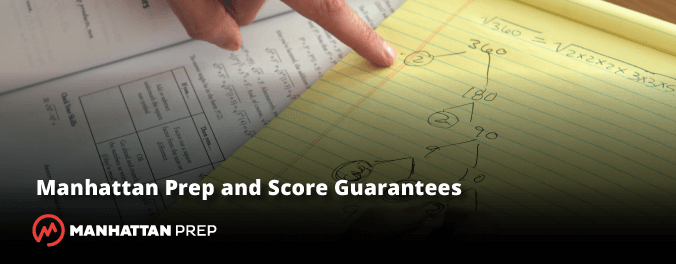Manhattan Prep and Score Guarantees
 Did you know that you can attend the first session of any of our online or in-person GMAT courses absolutely free? We’re not kidding! Check out our upcoming courses here.
Did you know that you can attend the first session of any of our online or in-person GMAT courses absolutely free? We’re not kidding! Check out our upcoming courses here.
This is a repost of a blog post from August of 2009 that was originally written by our then CEO, Andrew Yang. We frequently get questions from students about score guarantees so we felt like it would be useful to share our opinion of these guarantees, and why we don’t believe in them, again. The original post can be found here.
We occasionally get questions about why we don’t offer a score improvement guarantee.
There are a few little reasons, and one big reason. In our experience, a test prep score guarantee has a number of attendant issues: Read more
The Next-Gen GMAT: Graphics Interpretation

The launch of the Integrated Reasoning (IR) section is getting close! The last administration of the old version of the GMAT will be on 2 June; the next-generation GMAT will launch on 5 June. It’s not too late to study for the old version, but it’s also not too early to start thinking about studying for the next-gen test, including IR.
So let’s talk about one of the four IR question categories: Graphics Interpretation. IR in general is a mix of quant and logical reasoning, so expect to bring your critical reasoning and reading comp skills into play on this section.
Before we dive in, just a note: a new Official Guide (13th edition!) was just published; it has an IR section along with an additional IR resource online (to which you get access if you buy the book). I would guess that most test prep companies will also be releasing their IR study materials next month (we certainly are!).
Tackling a GMATPrep Critical Reasoning Inference Problem

This week, we’re going to discuss one of the most common critical reasoning problem types: Inference. (Note: our current materials call these questions Draw A Conclusion, but we’re changing the name next month!) If you haven’t yet, read this article before we try our GMATPrep problem. Then set your timer for 2 minutes and go!
* When a polygraph test is judged inconclusive, this is no reflection on the examinee. Rather, such a judgment means that the test has failed to show whether the examinee was truthful or untruthful. Nevertheless, employers will sometimes refuse to hire a job applicant because of an inconclusive polygraph test result.
Which of the following conclusions can most properly be drawn from the information above?
(A) Most examinees with inconclusive polygraph test results are in fact untruthful.
(B) Polygraph tests should not be used by employers in the consideration of job applicants.
(C) An inconclusive polygraph test result is sometimes unfairly held against the examinee.
(D) A polygraph test indicating that an examinee is untruthful can sometimes be mistaken.
(E) Some employers have refused to consider the results of polygraph tests when evaluating job applicants.
Manhattan GMAT’s Analysis of the 13th Edition Official Guide For GMAT Review
The 13th Edition of the Official Guide for GMAT Review (the Official Guide 13 or OG 13) has finally been released publicly. Here at Manhattan GMAT, we’ve done an initial analysis of the OG13 book.
1. The Official Guide 13 Is Not Radically Different
OG13 contains 907 practice problems for the main part of the GMAT (Quant & Verbal). Of those 907 problems, only 17% are new. Since you know your fraction equivalents, we don’t have to tell you that 17% is about 1 out of 6.

Out of 907 problems, 749 are repeats (yes, that’s 5 out of 6). If you already have the 12th Edition, a good way to look at the 13th Edition is as a source of 158 great new practice problems. We’ve listed them by number at the end of this post. Read more
Challenge Problem Showdown – March 19th, 2012
We invite you to test your GMAT knowledge for a chance to win! Each week, we will post a new Challenge Problem for you to attempt. If you submit the correct answer, you will be entered into that week’s drawing for a free Manhattan GMAT Prep item. Tell your friends to get out their scrap paper and start solving!
Here is this week’s problem:
(1.0002)(0.9999) “ (1.0001)(0.9998) =
The Next Generation GMAT: Two-Part Analysis

The launch of the Integrated Reasoning (IR) section is getting close! The last administration of the old version of the GMAT will be on 2 June; the next-generation GMAT will launch on 5 June. It’s not too late to study for the old version, but it’s also not too early to start thinking about studying for the next-gen test, including IR.
So let’s talk about one of the four IR question categories: the Two-Part Analysis. IR in general is a mix of quant and logical reasoning, so expect to bring your critical reasoning and reading comp skills into play on this section.
Read more
Debunking the “First 7 Questions” Myth
I don’t even need to say what the myth is! Everyone already knows—that’s how pervasive it is. Ever since the GMAT and GRE CATs launched in the 1990s people have believed that the earlier questions are worth more, that if we could get the first 7 (or 5, or 10) questions in a row right, we’d be guaranteed a really high score.
And you’ve likely also heard that this is a myth: from me, from other teachers, from Dr. Lawrence (Larry) Rudner, Chief Psychometrician of GMAC (the organization that makes the GMAT). And yet so many people still talk about it and believe it—so who should we believe?
Let’s talk about this and, hopefully, lay the myth to rest once and for all.
Challenge Problem Showdown – March 12th, 2012
We invite you to test your GMAT knowledge for a chance to win! Each week, we will post a new Challenge Problem for you to attempt. If you submit the correct answer, you will be entered into that week’s drawing for a free Manhattan GMAT Prep item. Tell your friends to get out their scrap paper and start solving!
Here is this week’s problem:
What is the absolute difference between the cubes of two different non-negative integers?
(1) One of the integers is 2 greater than the other integer.
(2) The square of the sum of the integers is 49 greater than the product of the integers.
What You Need To Know About Integrated Reasoning, Part 1
On Tuesday, June 5th, the GMAT is changing with the addition of a new section called Integrated Reasoning (IR). All of our Manhattan GMAT prep classes now cover Integrated Reasoning and will prepare our students for both the old test and the new test.Our IR Strategy Guide will be released to Manhattan GMAT students on April 9th and the general public on April 24th, along with IR practice exams and online IR workshops for our students.
The following article is Part 1 of a two part overview of Integrated Reasoning written by Manhattan GMAT’s Vice President of Academics, Chris Ryan. Part 1 answers the questions What is Integrated Reasoning and When should I take the GMAT?. Part 2 covers What Is different about IR and What’s the real danger of IR?.

What is Integrated Reasoning (IR)?
IR is a new, 30-minute section that’s going to replace the Issue Essay on June 5. No other part of the GMAT will be affected. IR will have a separate score”it will not factor into the 200-800 score that you really care about.
Read more
Challenge Problem Showdown – March 5th, 2012
We invite you to test your GMAT knowledge for a chance to win! Each week, we will post a new Challenge Problem for you to attempt. If you submit the correct answer, you will be entered into that week’s drawing for a free Manhattan GMAT Prep item. Tell your friends to get out their scrap paper and start solving!
Here is this week’s problem:
The integers a, b, c, and d can each be equal to 0, 1, 2, or 3, independently.
What is the value of (a + 1)(b + 1)(c + 1)(d + 1)?(1) a + 4b + 16c + 64d = 165
(2) 64a + 16b + 4c + d = 90
